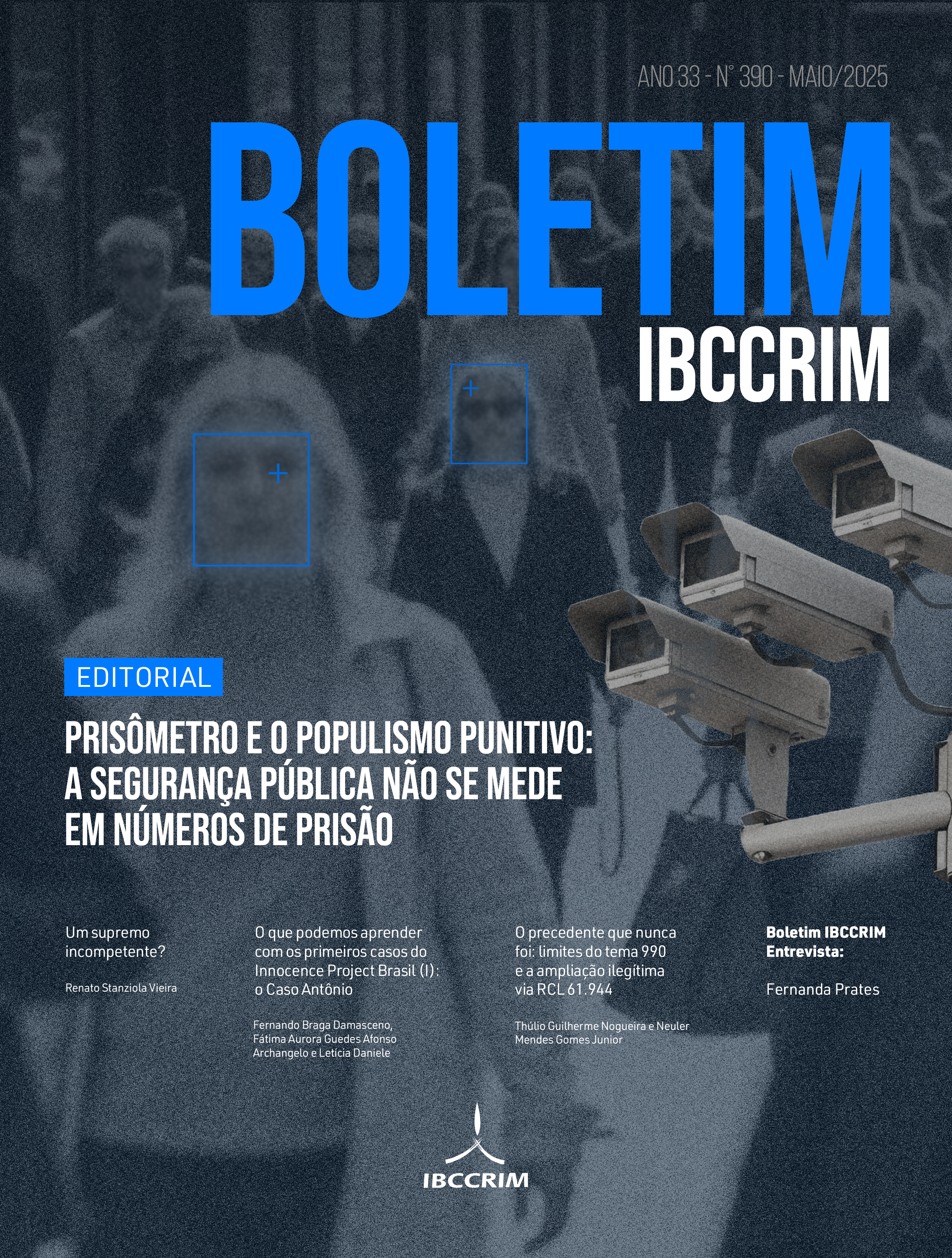The protection of mental privacy by criminal sciences in the face of the risks of mind reading technologies
Views: 125DOI:
https://doi.org/10.5281/zenodo.15007763Keywords:
Mind reading, Mental privacy, Neurotechnologies, Regulation, Criminal lawAbstract
The main objective of the article is to critically analyze mental privacy as a legal good, promoting a reflection on the current scope of privacy protection in Brazilian criminal law. The problem is based on the following question: is mental privacy protected by Brazilian criminal law? It can be said that it is, but in an unsatisfactory way within the criminal sciences, especially in the face of the growing advance of new technologies with mind reading capabilities. Thus, using a hypothetical-deductive methodological approach, the risks to this fundamental right will be presented, as well as relevant concepts, to conclude that, even though it is already protected, there is a pressing need for its regulation, which is one of the main proposals for mitigating the risks identified
Downloads
Publication Facts
Reviewer profiles N/A
Author statements
- Academic society
- Instituto Brasileiro de Ciências Criminais
- Publisher
- IBCCRIM
References
BRASIL. [Constituição (1988)]. Constituição da República Federativa do Brasil: promulgada em 5 de outubro de 1988. Disponível em: http://www.planalto.gov.br/c_03/constituicao/constituicaocompilado.htm. Acesso em: 10 abr. 2024.
BRASIL. Lei n. 13.709, de 14 de agosto de 2018. Dispõe sobre a Lei Geral de Proteção de Dados (LGPD). Disponível em: https://www.planalto.gov.br/ccivil_03/_ato2015-2018/2018/lei/l13709.htm. Acesso em: 10 abr. 2024.
BRASIL. Projeto de Lei n. 2.338, de 3 de maio de 2023. Dispõe sobre o uso da Inteligência Artificial. Disponivel em: https://legis.senado.leg.br/sdleg-getter/documento?dm=9347622&ts=1702407086098&disposition=inline. Acesso em: 10 abr. 2024.
CHILE. Corte Constitucional. Processo nº 105.065-2023. Relatora Ministra Ángela Vivanco, j. 09 ago. 2023. Disponível em: https://www.doe.cl/alerta/11082023/20230811001. Acesso em: 10 abr. 2024.
CORNEJO-PLAZA I. Chilean neurorights legislation and its relevance for mental health: Criticisms and outlook. Salud Mental, v. 46, n. 5, set.-out. 2023.
FRANÇA JÚNIOR, Francisco de Assis de; LEITÃO SANTOS, Bruno Cavalcante; NASCIMENTO, Felipe Costa Laurindo do. Aspectos críticos da expansão das possibilidades de recursos tecnológicos na investigação criminal: a inteligência artificial no âmbito do sistema de controle e de punição. Revista Brasileira de Direito Processual Penal, [S. l.], v. 6, n. 1, p. 211–246, 2020. DOI: 10.22197/rbdpp.v6i1.334.
HOFFMANN-RIEM, Wolfgang. Teoria geral do direito digital: transformação digital: desafios para o direito. Tradução: Ítalo Fuhrmann. 2. ed. Rio de Janeiro: Forense, 2022.
IENCA, Marcello; ANDORNO, Roberto. A New Category of Human Rights: Neurorights. Research in Progress [Online]. 26, abr. 2017 Disponível em: http://blogs.biomedcentral.com/bmcblog/2017/04/26/new-category-humanrights-neurorights/. Acesso em: 22 mai. 2024.
MOENS, J. Your brain waves are up for sale: a new law wants to change that. New York Times, Science, 17 abr. 2024. Disponível em: https://www.nytimes.com/2024/04/17/science/colorado-brain-data-privacy.html. Acesso em: 19 abr. 2024.
OECD. Recommendation of the Council on Responsible Innovation in Neurotechnology, OECD/LEGAL/0457. Disponível em: https://legalinstruments.oecd.org/en/instruments/OECD-LEGAL-0457. Acesso em: 19 abr. 2024.
PETERS, U. Reclaiming Control: Extended Mindreading and the Tracking of Digital Footprints. Social Epistemology, v. 36, 3. ed. 16 jan. 2022, p. 267–282. https://doi.org/10.1080/02691728.2021.2020366.
SOUSA, Susana Aires de. Neurociências e direito penal: em busca da “verdade” perdida (na mente)? Nótulas à margem do “caso Ricla”. Coimbra: Instituto Jurídico, 2017.
UNESCO. Consultation Paper On AI Regulation: Emerging Approaches Across the World. 16 ago. 2024.
UNIÃO EUROPEIA. Parlamento Europeu. Sessão de 16 de abril de 2024 que cria regras harmonizadas em matéria de inteligência artificial e que altera os Regulamentos (CE) n.º 300/2008, (UE) n.º 167/2013, (UE) n.º 168/2013, (UE) 2018/858, (UE) 2018/1139 e (UE) 2019/2144 e as Diretivas 2014/90/UE, (UE) 2016/797 e (UE) 2020/1828 (Regulamento da Inteligência Artificial). Disponível em: https://www.europarl.europa.eu/doceo/document/TA-9-2024-0138-FNL-COR01_PT.pdf. Acesso em: 21 abr. 2024.
VIDAL, Jacques J. Toward direct brain-computer communication. Annu Rev Biophys Bioeng, v. 2, p. 157-180, 1973.
WOLPAW, J. R.; BIRBAUMER, N.; MCFARLAND, D. J.; PFURTSCHELLER, G.; VAUGHAN, T. Brain–computer interfaces for communication and control. Clinical Neurophysiology, v. 113, p. 767-791, 2002. https://doi.org/10.1016/S1388-2457(02)00057-3
YUSTE, R.; GOERING, S.; ARCAS, B. et al. Four ethical priorities for neurotechnologies and AI. Nature, v. 551, p. 159–163, 2017. https://doi.org/10.1038/551159a
Downloads
Published
How to Cite
Issue
Section
License
Copyright (c) 2025 Bruno Leitão

This work is licensed under a Creative Commons Attribution-NonCommercial 4.0 International License.
Copyright of published articles belongs to the author, but with journal rights over the first publication and respecting the one-year exclusivity period. Authors may only use the same results in other publications by clearly indicating this journal as the medium of the original publication. If there is no such indication, it will be considered a situation of self-plagiarism.
Therefore, the reproduction, total or partial, of the articles published here is subject to the express mention of the origin of its publication in this journal, citing the volume and number of this publication. For legal purposes, the source of the original publication must be consigned, in addition to the DOI link for cross-reference (if any).


 Português (Brasil)
Português (Brasil)
 English
English
 Español (España)
Español (España)







